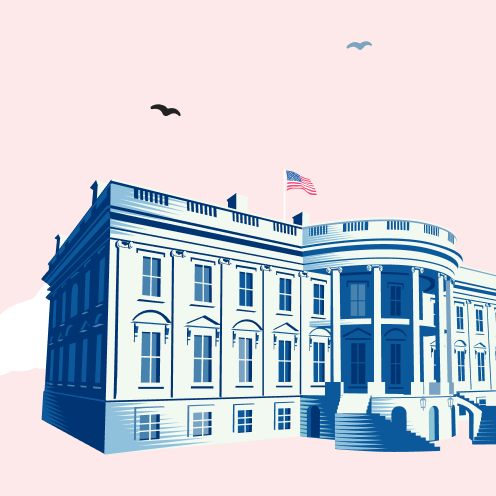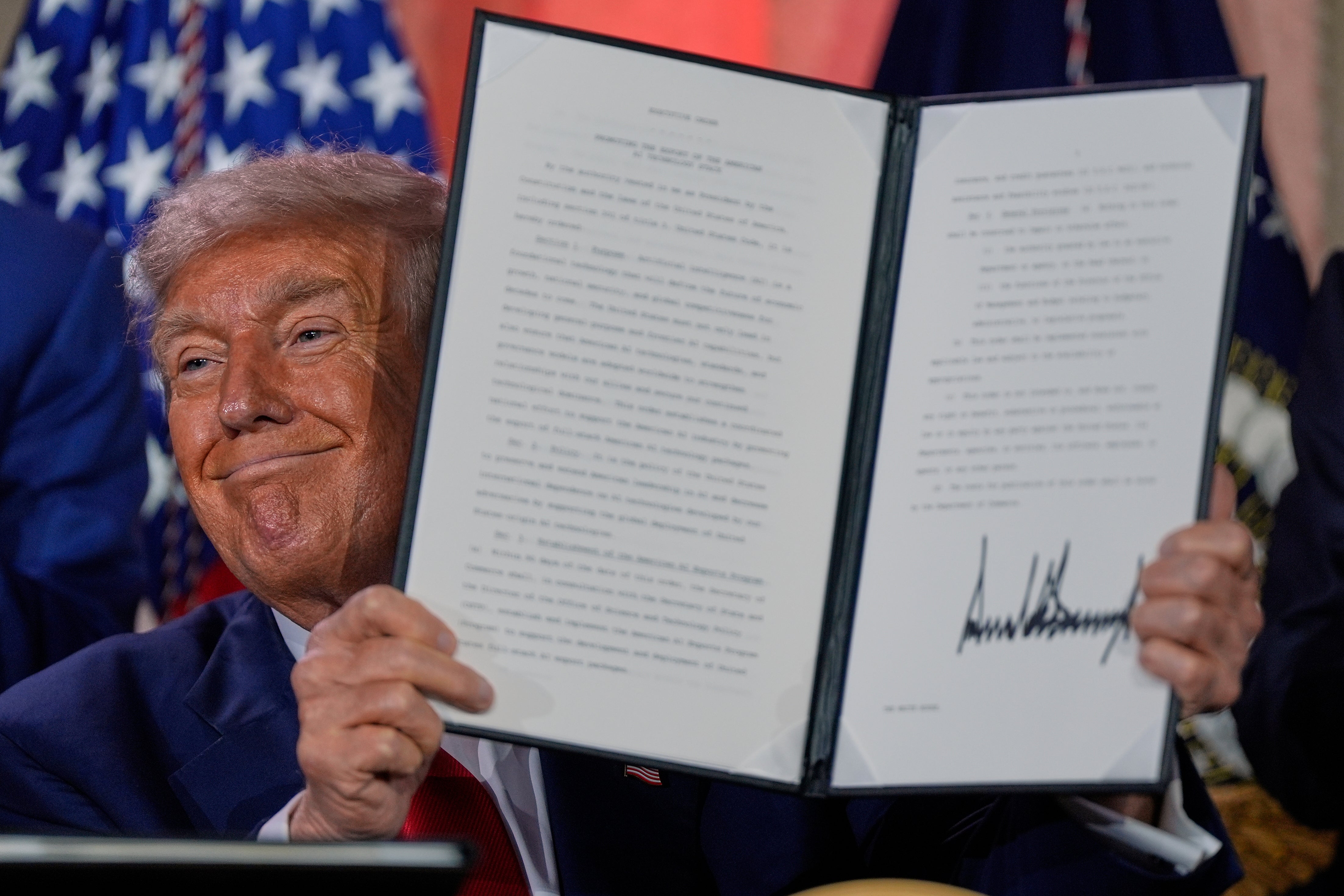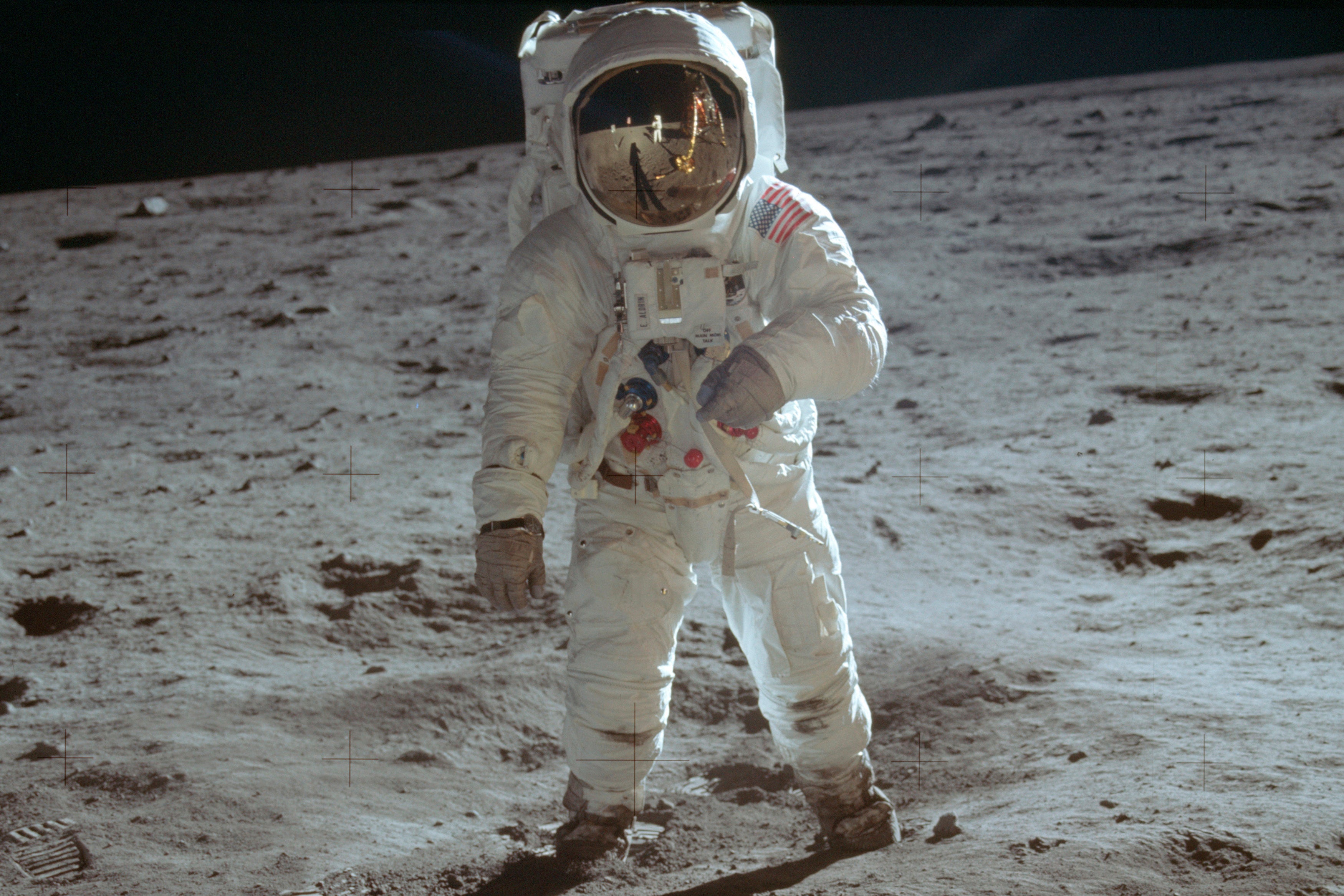- News
- World
- Americas
- US politics
The new project will give AI models access to voluminous amounts of scientific data in hopes of discovering new drugs and other scientific breakthroughs
Andrew Feinbergin Washington, D.C.Monday 24 November 2025 22:16 GMTComments
 CloseTrump questions the audience on Artificial Intelligence during Michigan rally
CloseTrump questions the audience on Artificial Intelligence during Michigan rally
Sign up for the daily Inside Washington email for exclusive US coverage and analysis sent to your inbox
Get our free Inside Washington email
Get our free Inside Washington email
 Email*SIGN UP
Email*SIGN UPI would like to be emailed about offers, events and updates from The Independent. Read our Privacy notice
That’s one giant leap for AI.
The Trump administration is unleashing thousands of massive data sets — compiled by agencies throughout the federal government — and the capabilities of America’s world-renowned national laboratories into a government-wide effort to supercharge and coalesce scientific research using Artificial Intelligence in the hope of developing new drugs and other major breakthroughs.
President Donald Trump signed an executive order on Monday establishing what the administration is calling the “Genesis Mission,” with top administration officials predicting that the new effort will go down in history as having equal importance to America’s Cold War-era space race that saw the US meet President John F. Kennedy’s 1962 vow to land a man on the Moon before that decade’s close.
Michael Kratsios, the director of the White House Office of Science and Technology, described the new Trump administration AI project as the “largest marshaling of federal scientific resources since the Apollo program” during a call with reporters earlier Monday.
He explained that the project’s “national AI for science effort” would leverage “the unmatched computing capabilities and resources of the Department of Energy's National Laboratories to unlock federal data sets, enable autonomous, closed loop experimentation and massively accelerate the rate of scientific breakthroughs,” such as the rate of new drug approvals that have “flatlined or declined” over the last few decades.
 open image in galleryTrump has signed multiple executive orders meant to boost Artificial Intelligence development since returning to power in January (Copyright 2025 The Associated Press. All rights reserved.)
open image in galleryTrump has signed multiple executive orders meant to boost Artificial Intelligence development since returning to power in January (Copyright 2025 The Associated Press. All rights reserved.)“Since the 1990s America's scientific edge has faced growing challenges ... the Genesis Mission aims to overcome these challenges by unifying agencies scientific efforts and integrating AI is a scientific tool to to revolutionize the way science and research are conducted by fusing massive federal data sets, advanced supercomputing capabilities and world leading scientific facilities,” Kratsios said.
Specifically, the White House science policy boss said the project would use artificial intelligence to “automate experiment design, accelerate simulations and generate predictive models” across a range of areas of scientific inquiry.
He further predicted that the result would be to “shorten discovery timelines from years to days or even hours” while “empowering scientists to test bolder hypotheses and discover breakthroughs that are currently unreachable.”
“This initiative builds upon President Trump's visionary science and tech leadership actions as it advances our understanding of unique government data assets developed across science, energy, health and manufacturing. With the power of AI, America is on the brink of a scientific revolution that will redefine American global scientific supremacy,” Kratsios said.
Energy Secretary Christopher Wright said the new Trump-backed AI effort would “unlock American ingenuity” and “American drive” with what he called the “bringing together of scientific data sets of the top scientists across our 17 national laboratories, across our United States university system, and across the private sector businesses that are focused on science, engineering, innovation, energy, all of the areas that the Genesis mission will focus on.”
Wright told reporters that the point of the Genesis mission would be to “pivot” existing private sector AI tools from language, business, data processing and consumer services to “focus on scientific discovery and engineering advancement” using the combined data held by the country’s national laboratories — with the aiming driving an “an incredible increase in the pace of scientific discovery and innovation.”
 open image in galleryTrump signed an order on Monday establishing the “Genesis Mission,” with top administration officials predicting the new effort will go down in history as having equal importance to America’s race to the moon.
open image in galleryTrump signed an order on Monday establishing the “Genesis Mission,” with top administration officials predicting the new effort will go down in history as having equal importance to America’s race to the moon.The energy secretary also said the project would have a further goal of making the electricity grid more efficient and to reverse price hikes he admitted have left American citizens “infuriated.”
“We're going to harness the ability to increase American energy production, creating jobs opportunity for this generation and for the next generation,” he said.
A senior administration official who briefed reporters on condition of anonymity said the Genesis project’s data usage would be “very careful with respect to intellectual property rights” and make allowances to restrict AI access to some data on national security grounds.
But the official said that even with those guardrails, the project would have access to “an enormous amount of scientific and engineering data in our labs that are free to be used” to “ massively advance the rate at which AI can actually do science and do engineering.”
Another official said the U.S. national laboratories will augment their existing supercomputer capacity — including the top-three supercomputers in the world — with additional “AI supercomputing capacity” built with the aid of private sector partners.
“We are going to leverage all the resources we have already, and then we expect that to our partners and in the future with Congress, that we will continue to invest increasing amounts for the success of the mission,” the official said.
The president’s latest initiative is just the most recent example of the Trump administration’s bear-hug with the artificial intelligence and technology sectors following last year’s presidential election, when multiple technology moguls poured millions into his presidential campaign.
Even First Lady Melania Trump has gotten in on the AI act by making a a rare appearance at the White House for an AI Task Force meeting in September, during which she told task force members, including several cabinet secretaries, that Americans are “living in a moment of wonder” thanks to recent technological developments.
She urged technology industry leaders to treat burgeoning Artificial Intelligence models “like our own children” and encouraged the use of “watchful guidance” as she cautioned them to act responsibly to manage the growth of the new technology.
“Cars now steer themselves through our cities, robots hold steady hands in the operating room and drones are redefining the future of war. Inventions of first-generation humanoids, factory automation and autonomous vehicles have surged from private sector investment. Every one of these advancements is powered by AI,” she said.
“The robots are here — our future is no longer science fiction.”
The First Lady has also launched what her office calls the President’s Artificial Intelligence Challenge for students in kindergarten through 12th grade.
More about
ScientistsDonald Trumpartificial intelligenceJoin our commenting forum
Join thought-provoking conversations, follow other Independent readers and see their replies
Comments